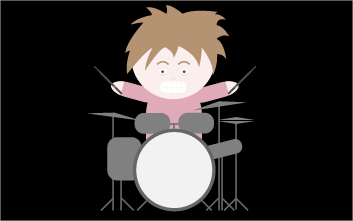Drummers. No, this isn’t the setup to some hacky gag – I’m here to celebrate those scruffy little devils. You see unlike some folks of lesser virtue, I have only the greatest level of care and affection for those who hit things rhythmically. In my many years of frustrated musicianship, I’ve played alongside a wide range of skin-hitters and I promise you that no other breed of professionals is so varied and delightful. Each drummer is a snowflake. Am I dealing with a technician here, a quasi-drum machine of frightening precision for whom even the slightest fill is a wanton extravagance? Or maybe I’m standing next to a rolling ball of nimble syncopation, struggling in vain to get a musical word in edgewise?
There are so many types of drummers, and their unique idiosyncrasies are arguably what plays the biggest role in dictating the feel – good or bad – of any band. But unfortunately this breed has long been the subject of cruel taunts and foul humour. But no longer. Once more, lady science descends from her lofty perch and sets the record straight.
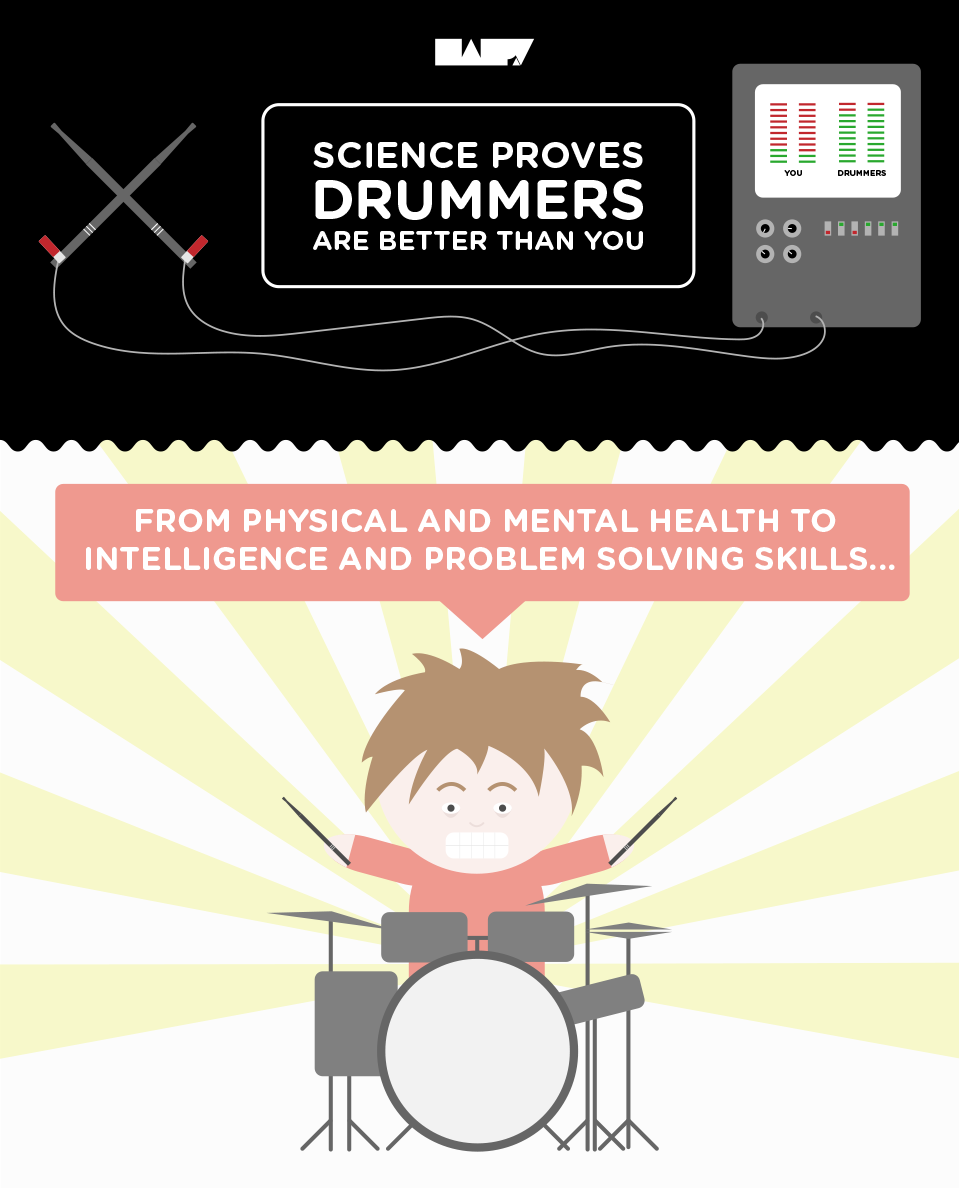
They can be viewed as the brute who just hits things in the back, but the truth is a drummer is far healthier and happier than the average bear.
First, let’s rid ourselves of the old ‘not real musicians’ bit. Okay, I get the temptation to scoff here. At its simplest, yes, drumming is the art of hitting things, and anyone can do that. But not everyone – indeed not many at all – can actually sound good while doing it. Sure, drummers don’t have to worry quite so much about being in tune, but as qualified experts have pointed out, that doesn’t mean they can’t be melodic. Think of the range of sounds on offer from even a modest kit – the roll, the rimshots, the bells, the brushes. They might seem like fine details but in actuality the whole mood of a song can be vastly altered by the musical choices of the drummer.
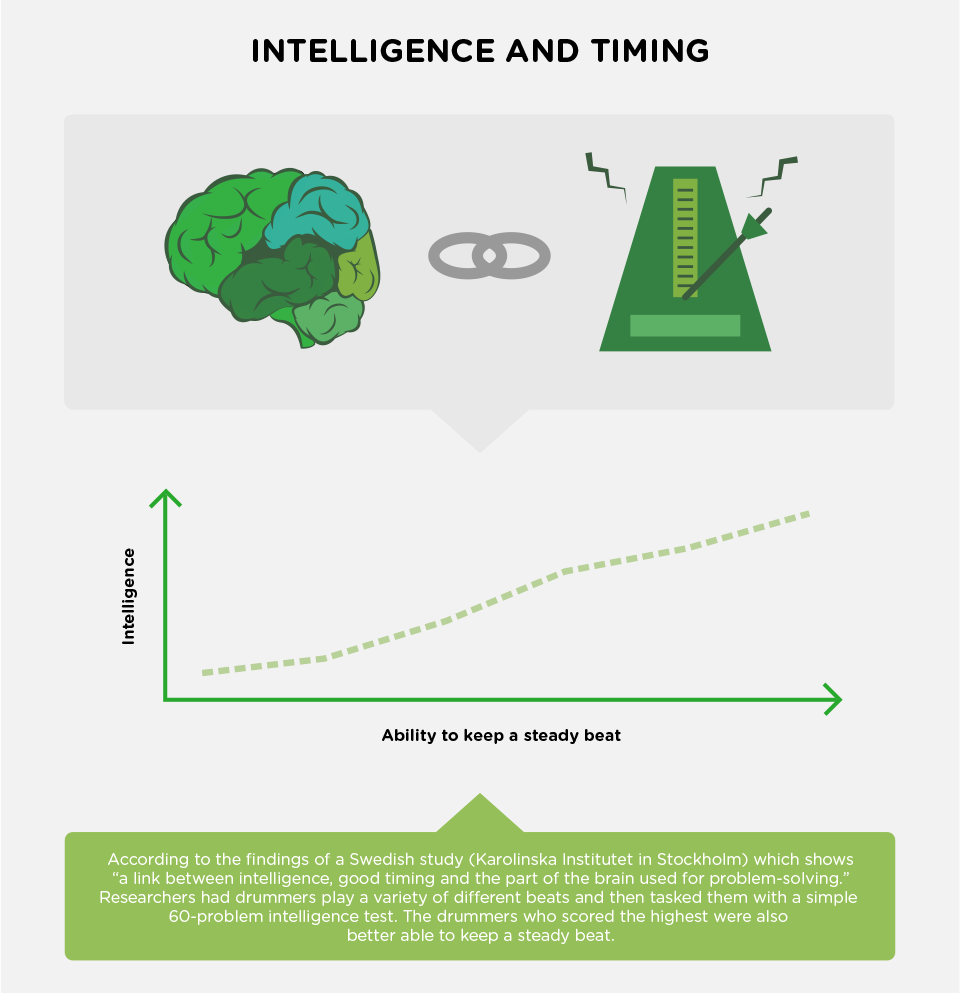
According to the findings of a Swedish study (Karolinska Institutet in Stockholm) there is “A link between intelligence, good timing and the part of the brain used for problem-solving.” Researchers had drummers play a variety of different beats and then tasked them with a simple 60-problem intelligence test. The drummers who scored the highest were also better able to keep a steady beat. If delving into the world of drummer neurology excites you be sure to check out the guys from Open Culture.
Would Zeppelin sound quite so heavy if John Bonham had ditched the sticks for a set of brushes? Why don’t jazz combos ever whip out the double kick pedal? Two of the most immediately identifiable aspects of any genre are the tones and rhythms of the percussion section, and figuring out what works requires a whole lot of deep listening on the part of the drummer. Yet we bash them for not being musical – and even worse they seem to believe it too. Once more from the world of science we have evidence that drummers on average view themselves as being less intelligent than their musical peers.
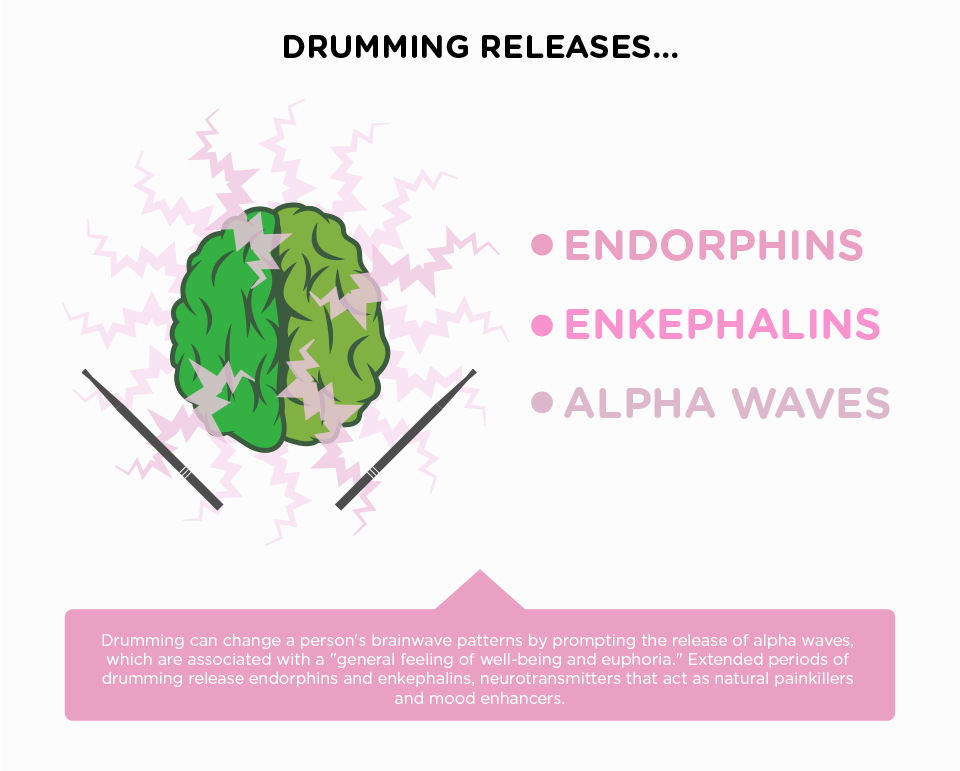
And that’s just not true. Not only have we got our hands on some sweet, juicy data indicating the improved problem solving skills of drummers who keep a tighter rhythm, but it turns out being around particularly rhythmic music can improve the concentration and intellectual performance of those who hear it. This sits pretty well with my experience of the drummerhood. Sure, drummers have never struck me as the most normal of people. It feels like every drummer I’ve ever played with has at least one feature that sets them out from most folks, like a complete lack of an inside-voice or a strange obsession with the colour black.
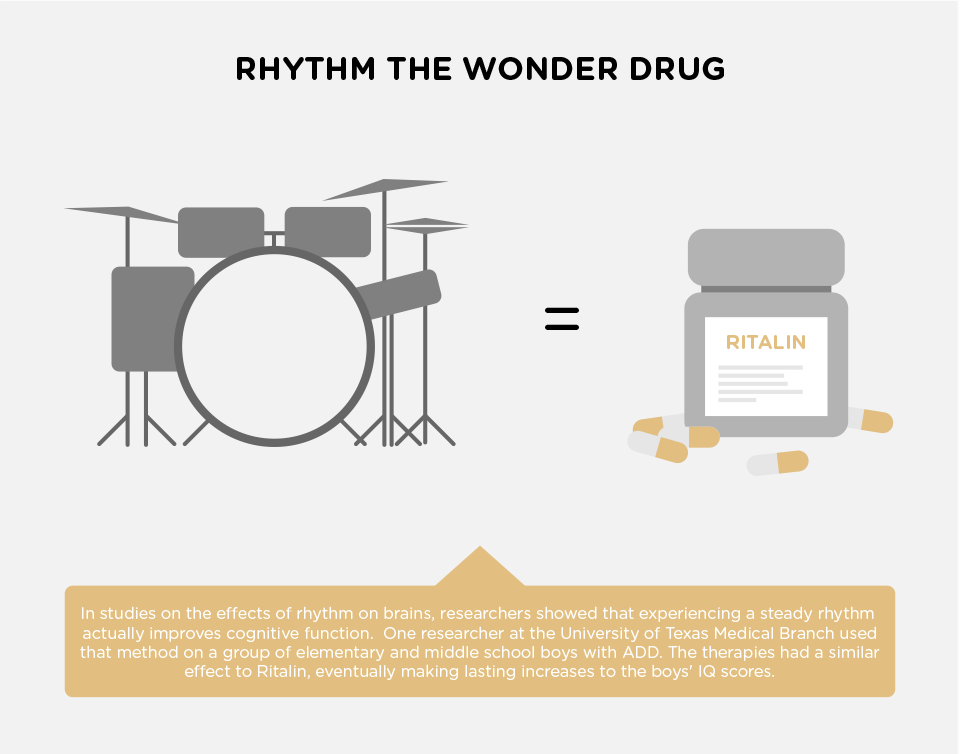
But while they might be a little strange, sometimes to the point of frustration, I couldn’t ever in good faith describe the drummers I’ve played with as anything less than intelligent. And you kind of have to be, when you think about it. A good professional drummer has to be on top of a whole lot of stuff at once, wrangling the tempo and often dictating the feel of the piece, while playing with all four limbs, often throughout for more of each song than any other band member. You might need to be slightly insane to do it, but you definitely can’t be dumb.
Drumming isn’t just tough to do though; it turns out it’s also good for you. The latest from the lab is that drumming for a while releases a wonderful pot pourri of natural brain juices that dull pain, improve your mood, and boost the immune system. The guys from Music. Mic make a pretty good point of this too. True, these effects can also be felt by playing other musical instruments, but not to the same degree. It makes sense really, given how much more physically demanding the drums are.
Drumming can change a person’s brainwave patterns by prompting the release of alpha waves, which are associated with a “general feeling of well-being and euphoria.” Extended periods of drumming release endorphins and enkephalins, neurotransmitters that act as natural painkillers and mood enhancers. In studies on the effects of rhythm on brains, researchers showed that experiencing a steady rhythm actually improves cognitive function. One researcher at the University of Texas Medical Branch used that method on a group of elementary and middle school boys with ADD. The therapies had a similar effect to Ritalin, eventually making lasting increases to the boys’ IQ scores.
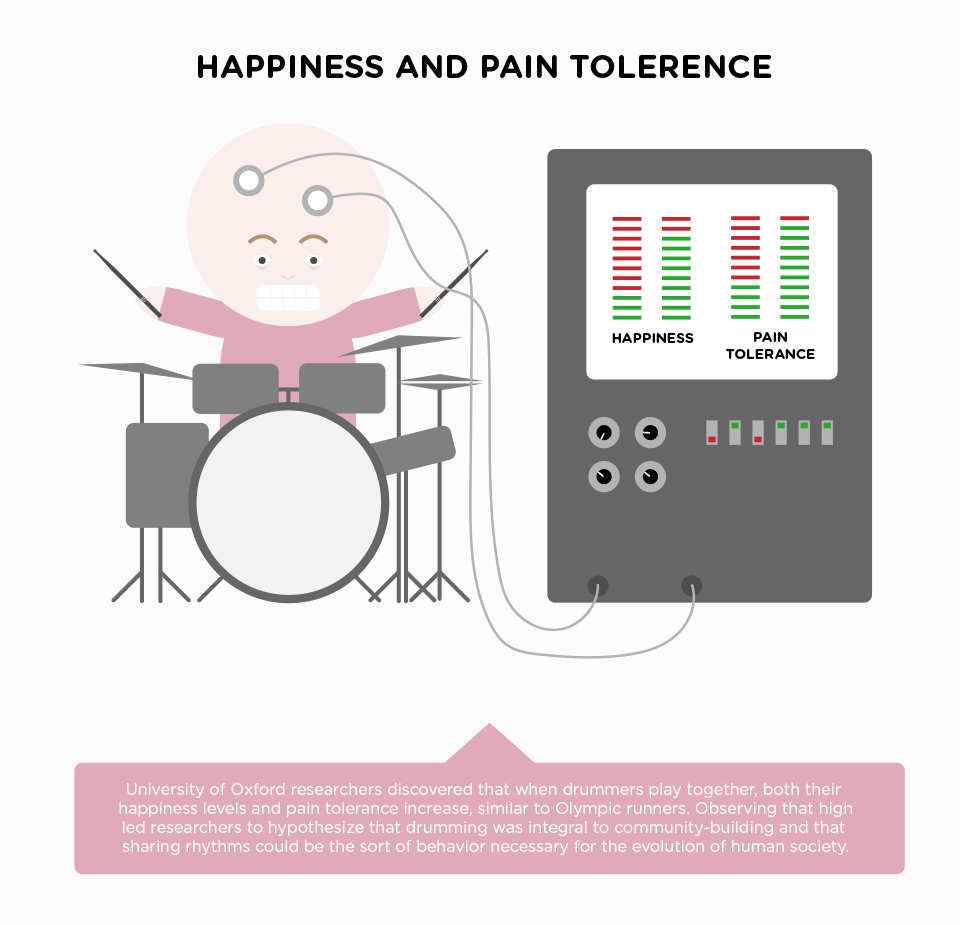
Stanford University School of Medicine conducted a study with 30 depressed people over 80 years of age and found that participants in a weekly music therapy group were less anxious, less distressed and had higher self-esteem. According to Clair, Bernstein and Johnson (1995), Alzheimer’s patients who drum can connect better with loved ones. The predictability of rhythm may provide the framework for repetitive responses that make few cognitive demands on people with dementia. Rhythmic cues can help retrain the brain after a stroke or other neurological impairment. Researchers have also discovered that hearing slow, steady rhythms, such as drumbeats, helps Parkinson patients move more steadily.
Chronic pain has a devastating propensity for progressively draining quality of life. Technology and pharmacology are falling short of the mark needed to improve quality of life and reduce pain, whilst experiments have shown drumming to have positive effects. Subjects who participated in a clinical trial using the Health Rhythms protocol showed an increase in natural killer cell activity and an enhanced immune system. While this does not indicate a cure for cancer, such results may be of benefit for those facing this disease.
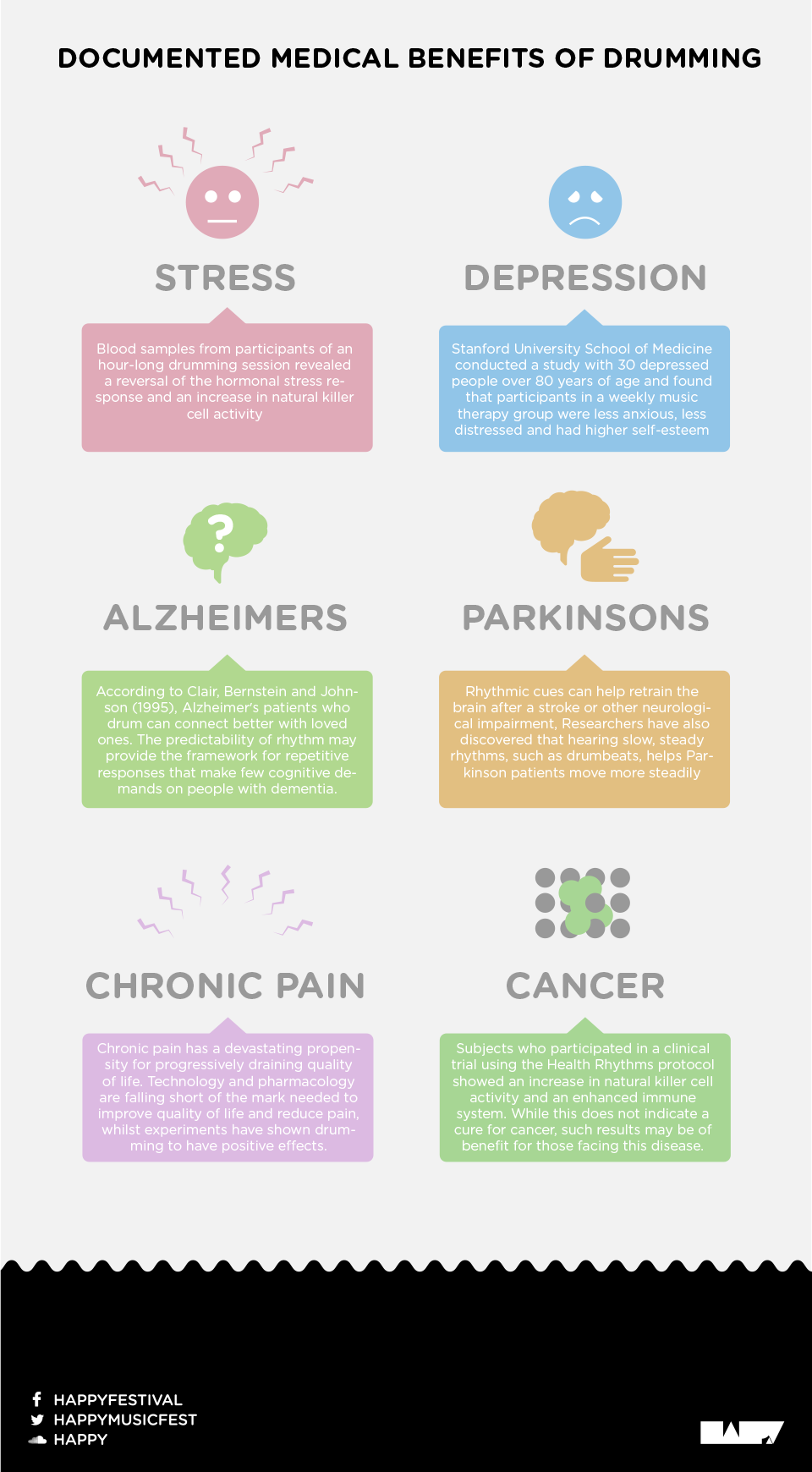
Find any older drummer who’s kept it going through the decades and you’ll most likely be faced with a body that’s only able to face the full-body workout of each evening’s gig through a whole host of preventative measures. It’s intense, and that can make it tricky as you get older, but it also means each gig gives you the benefits of rigorous exercise. It doesn’t take a genius to point out that exercise is kinda good for you. Drumming isn’t just difficult then – it’s useful.
University of Oxford researchers discovered that when drummers play together, both their happiness levels and pain tolerance increase, similar to Olympic runners. Observing that high led researchers to hypothesise that drumming was integral to community-building and that sharing rhythms could be the sort of behaviour necessary for the evolution of human society. Blood samples from participants of an hour-long drumming session revealed a reversal of the hormonal stress response and an increase in natural killer cell activity
So stow those slings and arrows, friends. Sure, we all like having a perennial dumpsite for all our cruel taunts, but if we allow our jibes to fly in the face of science then we do grave violence to the self-respect of the musical trade. Let’s let the facts speak for themselves. These folks who have been derided for so long are secretly reaping the many benefits of rhythmic hitting while we sit back and snigger. There are so many different types of drummers out there, and while no category of musicians is free of duds, let’s not buy into the myth of the drummer as fool.

Illustrations and concept by our digital agency, IYBI
While you’re here, have your mind blown by these song facts about classic tracks.
